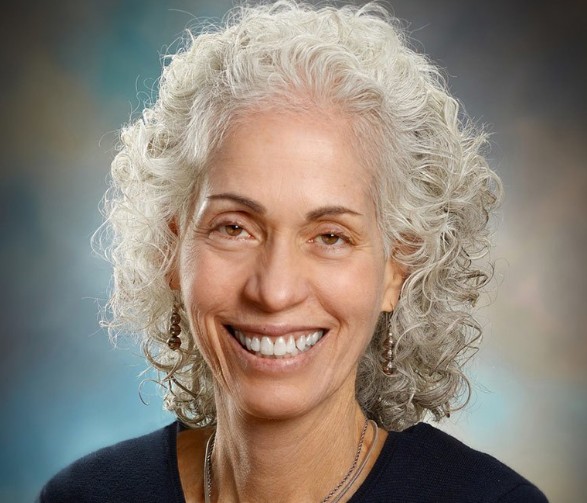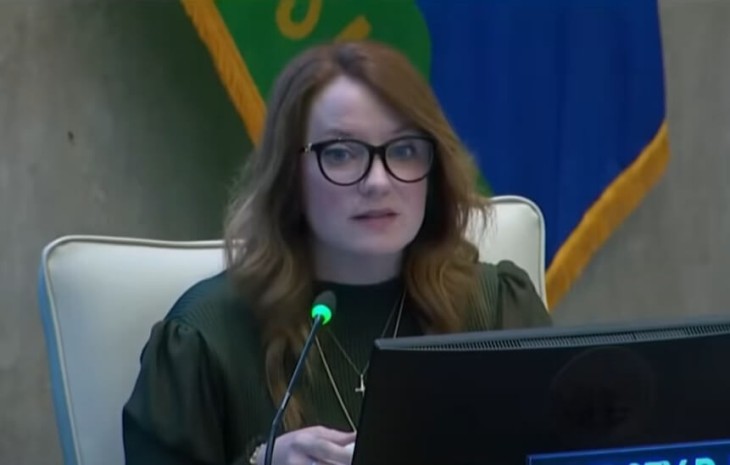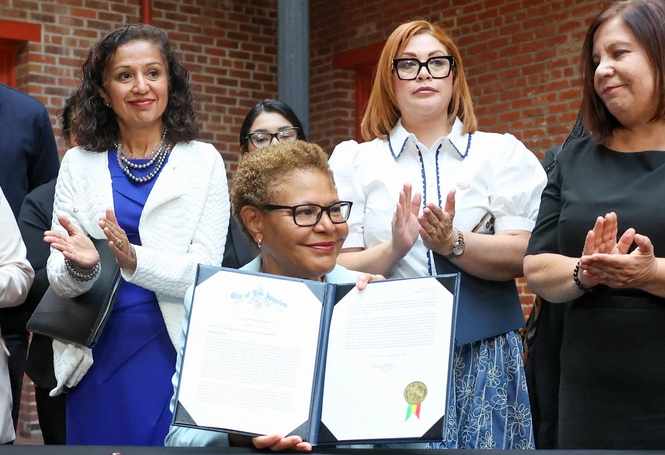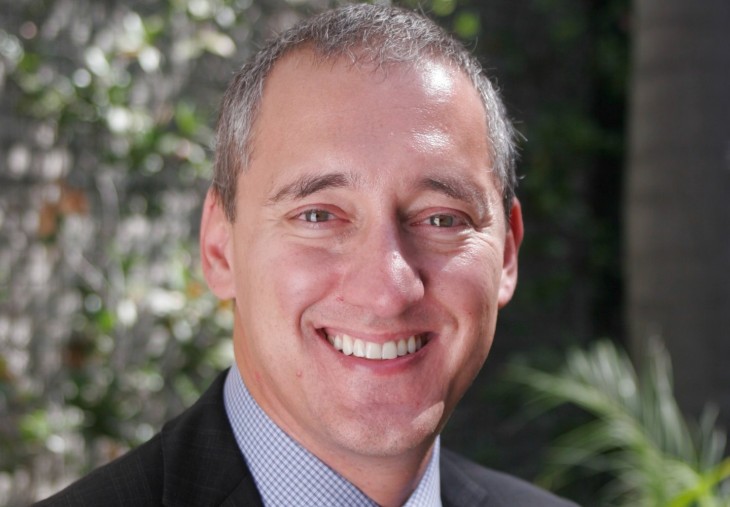What can you say about one of the world’s most gifted actresses? We have watched Australian-born Cate Blanchett transform herself on the big screen creating a myriad of distinctly different characters.
She’s Elizabeth in “Elizabeth I,” Lady Gertrude Chiltern in “An Ideal Husband,” Connie in “Pushing Tin,” Meredith in “The Talented Mr. Ripley,” Galadriel in “The Lord of the Rings: The Fellowship of the Ring,” Veronica in “Veronica Guerin,” Tracy in “Little Fish,” Lena in “The Good German,” Sheba in “Notes on a Scandal,” (Academy Award nomination for Best Supporting Actress), Jude in “I’m Not There,” Irina in “Indiana Jones and the Kingdom of the Crystal Skull,” Daisy in “The Curious Case of Benjamin Button,” Marion in “Robin Hood,” Marissa in “Hanna,” and her most memorable performance as Katherine Hepburn in “The Aviator,” for which she received an Academy Award for Best Supporting Actress.
In each of these roles, Blanchett endows her characters with her special brand of acting and has once again turned in a riveting performance as Jasmine French in Woody Allen’s “Blue Jasmine,” adding her character to the long list of fabulous female roles Allen has written during his long film career as writer and director.
Although truly the star of “Blue Jasmine,” Blanchett is backed up with a strong supporting cast which includes Alec Baldwin, Sally Hawkins, Louis C.K., Bobby Cannavale, Andrew Dice Clay, and Peter Sarsgaard.
The fascinating story alludes to the Bernie Madoff scandal but focuses on her character as his emotionally declining wife and graphically takes us through the consequences of the rise and fall of great wealth, power, and social status.
Actors Studio trained Peter Sarsgaard’s first role was in “Dead Man Walking,” and since then he has given solid performances in such films as “Desert Blue,” and “The Man in the Iron Mask,” drew critical attention for his role in “Boys Don’t Cry,” eventually earning multiple awards including the National Society of Film Critics Award for his role in “Shattered Glass.”
Other films include “K-19: The Widowmaker,” “The Salton Sea,” “Kinsey,” “An Education,” “Garden State,” “Flightplan,” “Knight and Day,” and “Jarhead,” in which he co-starred with his brother-in-law Jake Gyllenhaal.
Blanchett and Sarsgaard recently participated in a non-exclusive press conference and the following has been edited for content and continuity.
You’ve done an impressive cross section of characters. Do you have a specific technique for preparing for a role?
Blanchett: I don’t have particular process. I think the material, the director, and the other actors reveals what you need to do. Woody was very much about it being alive. He wasn’t interested in anyone’s homework. Obviously, as you were alluding to, the material is so dense, especially with Sally (who plays her sister) and I in particular, who I think are the only two people who got the whole script. We talked a lot about the back-story and how that can inform the subtext. But it was a fascinating thing to play different aspects of Jasmine. With different people, she was an entirely different person.
Sarsgaard: I had no idea what was going on. I had only read my small part, which is completely isolated from the rest of the story so I thought that Cate had kind of lost her mind, (laughter) and my job was to help her. In terms of preparing for this role, there was very little preparation, partly because I knew so little. My wardrobe was a very significant thing because it was one of the few things I had before I started. I remember getting my wardrobe, which is all Ralph Lauren. My underwear is Ralph Lauren. My socks are Ralph Lauren. It was all Ralph Lauren (laughter), which is like what my father wears so I started feeling kind of uncomfortable in the fact that you know your have to wear that clothing in a certain way which really reminded me of my father.
How familiar were you with the Madoff debacle?
Blanchett: I followed the Madoff scandal like everybody, but there’s a whole other mini series in that fiasco and that wasn’t what Woody was basing it on so this was another story. This is fiction and you have to play Woody’s script because the characters are so beautiful.
Your character is suffering from a mental illness. Did you do any special research on that?
Blanchett: Yes, but I’m no so “method” that I took Xanax every night. But, it’s amazing things you find on YouTube. So, yes, it was important for me to chart through when she’d taken a Xanax, how many she’d taken, if she mixed it with alcohol, and what the mental and physical effects would be. Also, what I was trying to see was that sense when she was beginning to have a panic attack and when she would break out in a sweat. So, her physical state and her psychological state were kind of interesting balls to try and juggle.
What attracted you to the role and how much direction did you get from Woody?
Blanchett: What did you say? (laughter)
Sarsgaard: Character direction.
Blanchett: Character direction. Thank you. This is what it was like working with men (laughter). When you get Woody’s call, you take it and you’ve already said yes before you know what it is and you just hope it’s a good one. Of course, his films are never less than fascinating. I’d given up hope of ever working with him. I thought he just wasn’t interested. The minute I read the script, I thought it was fantastic. It was impeccably structured. It’s absurd and tragic. I had heard that he was monosyllabic at best in relation to the direction he gave actors, but I found he responded if he thought the questions were interesting and if he didn’t, he just waved me off (laughter). A lot of the directing is in the script. I would say, “how would you do it Mr. Allen?” And he would get very Blanche Dubois like (laughter). I said to him you know, you should have played this role and asked him if he had considered that. He thought about it for a minute and said, “No, it would have been too comic.” But he was great and I think he despised and revered Jasmine and I think he was fascinated by her. Just think about all the extraordinary female characters he’s created with such wonderful actresses. He loves women – their exuberance, their intelligence, their fear, their phobias.
Peter, how did you react when you got a call from Woody Allen?
Sarsgaard: My wife was very pregnant and we were waiting for the baby to come. I got a call from my agent that he wanted to meet me. I had met Woody once before years ago on “Everyone Says I Love You” so I knew what the meeting was going to be like. I walked in and he was incredibly affable actually and said that he was shooting this film this summer and that there was a part I was right for. And are you doing anything else besides having a baby? I said, is there anything else? (laughter) I said no. I hadn’t been planning on working. He said it won’t take very much time and that he would send the script over to my house and the pages were sent over to my house just for my character. I actually had trouble concentrating on the pages as I was reading them because I was like of course I’m going to do this. I always wanted to be in a Woody Allen film. I’ve been a huge fan forever.
Did Jasmine ending up on a park bench talking to herself surprise you?
Blanchett: Yes. I found the whole story surprising and not surprising when you think about what’s happened to people financially. If you sit in a park, you invariably will see someone mumbling to themselves and sometimes they’ll be very well heeled. I thought Jasmine was just going to be in the Channel jacket and Woody was happy with that. Then I thought maybe we could do something that was a bit off so I said what if I had a shower and walked out of the house without any make-up which is a probably a career killer (laughter). When you sit next to someone who is mentally disturbed or in the middle of a break down, they can look, for all intents and purposes, completely put together, but there’s a vibration that comes off.
So that was your idea not to blow-dry your hair?
Blanchett: It came out of a conversation. I don’t want to say it was my idea.
What did you like about your character?
Blanchett: I disagree. You don’t have to like your character. It’s not forming to like them or dislike them. I think that’s where lies sentimentality and particularly with a character like Jasmine, who a lot of what she does is unpalatable, it’s your job to find out why they are behaving they way they are. The story telling does that and it’s your job as an actor to make that subtext come to life. So I think one can be compassionate, but you don’t necessarily have to like your character.
Sarsgaard: The only question I ever asked Woody directly about my character was, I remember the day I proposed marriage and I said, really like why am I… Where is this coming from and he said, you want a wife. I went. Right. A wife. In watching the film, I realize that the audience starts rooting for her to be with me knowing nothing about me except that I’m wealthy. I’m like a life raft. There’s no like love thing that kicks off there. It’s just that I wear clothes that look like I’m a wealthy man. I actually have the quality of someone who is not only wealthy, but who’s like very comfortable in it and I’m ambitious. So it made me play someone who is rather shallow. Somebody who would ask someone to marry them just because they she looks right. They look like a great person to stand next to. They seem reasonable enough to get along with; you know like we get along well enough and I like you. But there’s a lot of stuff that I’m ignoring like this very dominant flavor that’s coming off of her of insanity that I’m just letting drift away and going, but once you take your pills, it’s going to be great (laughter). So, as I watched the film, I do see the way as I kind of create this expectation of safe passage and then we all realize oh, what she actually needs is money again, but that’s not really going to save her.
This is a story about the effects of loss of wealth and status. Have you seen anyone in your profession experience this?
Blanchett: I don’t think it happens just in this profession. I think it’s happened all over America and all over the world where peoples’ sense of self is bound up in their relationship or in their financial status and social circle and when all of that is ripped away, which are the building blocks of our identity, so often in mid-life, you have to look at yourself and say who the hell am I? If you don’t have financial security, and you don’t have a support structure, then madness can pretty quickly set in.
How do you re-center having some of those really emotional scenes?
Blanchett: The experience was quite intense. There were so many lines to learn; so many situations to unravel. But, my children are there and are not interested in whether you’re playing Blanche Dubois or Jasmine French; they just want to do their homework and have you play with them and feed them. And, I find that a great leveler. You have to switch off. But, that’s probably more a question my husband could answer (laughter).


























